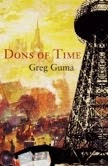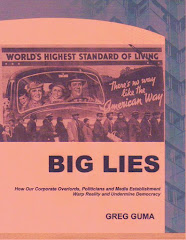 This week on Maverick Media’s Rebel News Round Up, broadcast live at approximately 11:30 a.m. Friday on WOMM (105.9-FM/LP – The Radiator) in Burlington. The Question: Do we prefer the virtual to the real? Looking back at 2010: celebrity misadventures, earthquakes and other disasters, corporate crimes, governing toward gridlock, return of the culture war, media breakthroughs, endangered humanity, and the rumor of the week.
This week on Maverick Media’s Rebel News Round Up, broadcast live at approximately 11:30 a.m. Friday on WOMM (105.9-FM/LP – The Radiator) in Burlington. The Question: Do we prefer the virtual to the real? Looking back at 2010: celebrity misadventures, earthquakes and other disasters, corporate crimes, governing toward gridlock, return of the culture war, media breakthroughs, endangered humanity, and the rumor of the week..
Live Stream: http://www.theradiator.org/drupal/webcam.html
Call-in: (802) 861-9666
Call-in: (802) 861-9666
SEASON OF THE RICH: 2010 in Review
Rednecks out to back a witch
Two parties running in a ditch
Yes, it’s strange very strange
Must be the season of the rich
Two parties running in a ditch
Yes, it’s strange very strange
Must be the season of the rich
It was a time of corporate theft, natural disasters, cultural counter-revolution and a general retreat from reality. According to Time, Facebook founder Mark Zuckerberg is the person of the year. Personally, I still can’t decide whether social networking is like the invention of the telephone, just an excuse to gossip, or a way to collect information on people and make it feel like fun. Still, my personal choice for most influential person is Wikileaks founder Julian Assange. And both wunderkinds owe their prominence to the existence of the Internet. So, maybe that was the year’s defining characteristic – the power of cyberspace, eclipsing both inner and outer space. Strange, very strange. And it raises the question: In 2010 has the virtual officially become more compelling than the real?
The year actually started with more traditional media madness and misbehaving celebrities. In January the big talk in TV circles was another late night war. After failing at 10 pm, Jay Leno reclaimed The Tonight Show and Conan O’Brien was bumped from the lineup. Tiger Woods, who was already a major meal for the press cannibals, apologized for his sexual misadventures and decided to take a break from golf. Both he and Conan returned to the spotlight before too long. And, of course, there was the pleasant distraction of the Olympic Games in February. But more shattering events were already erupting.
Here are five of the year’s major story lines – some acknowledged, others under or misreported.
EARTH SENDS A MESSAGE
As the argument over climate change continued, deniers got more than their fair share of attention and the planet sent some pointed messages of its own. In January Haiti, which has endured centuries of environmental abuse, was hit with a devastating earthquake. Thousands died and millions continue to suffer. How much can one small country take, especially the poorest in the Western hemisphere? Less than a month later, on February 24, came an 8.8 Earthquake and tsunami in Chile. The body count was much lower, but the quake itself was one of the largest in recorded history.
Less than two months after that, on April 14, ash from an exploding volcano in Iceland disrupted air traffic across Europe. And on October 25, another earthquake created another tsunami, this one off the coast of Indonesia’s Sumatra. Hundreds died. Still, despite such calamities and another year of strange weather, little was done to prepare for more environmental upheavals in the future. Message from the planet ignored.
CORPORATIONS GO TOXIC
Not to be outdone by nature, big businesses demonstrated that they’re ready to compete at creating chaos and putting humans at risk. They weren’t creating many jobs, but they certainly produced a few disasters. As Haiti reeled Toyota launched the year’s recall mania. Honda, Ford, even Lexus soon joined the club.
Here’s a partial list of the product recalls from our less-than-safe free market: Tylenol, Rolaids, cheese and eggs, cribs, strollers, car seats and kids medicine, pet food and 27 million pounds of meat and poultry processed for human consumption. Actually, in terms of food recall it may have been the year of egg: half a billion eggs were pulled after 2400 people were hit with salmonella contamination.
Other notable food recalls included lobster, chopped celery from a San Antonio processing plant that was linked to at least four deaths, more than a million pounds of salami and Italian sausage after people in 44 states got sick (the culprit turned out to be black pepper used to coat the meats), lettuce possibly contaminated with e. coli, salmonella and listeria, and lunch meat and frozen vegetables distributed by Walmart. (Some packages of veggies included a special bonus – shards of glass.)
But these mishaps pale when compared to the April 5 mine explosion in West Virginia, the Chilean miners trapped underground from August 4 to October 13, or the big Kahuna – the Gulf oil spill. On April 20, the Deepwater Horizon oil platform exploded. Eleven people working on the rig died right away. We may not ever know the full body count. The spill spread for months, damaging the US coastline, killing wildlife, and briefly prompting doubts about offshore drilling. Heck of a job, BP.
FROM CHANGE TO GRIDLOCK
You had to know it would be a rough year when, right out of the box, the Supreme Court announced its Citizens United decision, clearly one the year’s defining moments. Corporate funding of candidate ads couldn’t be limited anymore under the First Amendment. For a century corporate leaders couldn’t spend a company’s general funds in elections. They had to set up separate political action committees. But Citizens United says that corporations have the same First Amendment rights as real people, and restrictions violate those rights. Result: the 2010 elections saw an explosion of corporate money in campaigns, much of it anonymous. Obama went after the Supremes for that decision in his State of the Union, which probably didn’t help. They’re likely to become even more partisan in any future decisions about things like health care reform and gay marriage.
At first it looked like this would be a landmark year for legislation. Health Care Reform – not perfect, but perhaps a step in the right direction – became law on March 23. Four months later, the Democrats muscled through a financial reform bill. Elena Kagan, a pragmatic political player, joined the Supreme Court in the summer. But as the year proceeded it became tougher and tougher to get anything done. By December Republicans were vowing to block everything until the richest two percent get to keep their current tax rate. We had gone from modest reform to hostage taking in less than nine months.
RETURN OF THE CULTURE WAR
Most pundits saw the May primary victories of Tea Party and Palin-backed candidates as a key sign that some kind of revolution was brewing on the right. But I’d argue that the handwriting was on the wall by February 18. That was the day 53-year-old Joseph Stack, a software engineer, flew a small plan in an IRS building in Austin. Stack died in the crash but left a suicide note that explained his reason: he was upset about the government.
Another early warning was the April 23 signing of Arizona’s harsh "Papers Please" immigration law, which set off a national chain reaction of resurgent xenophobia. A few weeks later Rand Paul beat an establishment Republican candidate in the Kentucky Senate primary. The Tea Party was on the electoral map. Its endorsed candidates also scored upsets in Alaska, Colorado, Delaware, Florida, Nevada, New York, South Carolina and Utah. A strange new and somewhat uncontrollable force was gaining momentum.
By mid-summer we were in a political zombie movie. Anything could spark an attack of the brain-dead. On August 13, they declared a fatwa on what came to be known as the Ground Zero Mosque. Extremists competed for months to see who could be more anti-Muslim. Meanwhile, Glenn Beck transformed himself again – from rodeo clown (it’s just a hobby) to talk show host, and now televangelist and self-appointed savior of the nation. On August 28, he took the show to Washington, attempting to appropriate the civil rights movement by holding a rally on the steps of the Lincoln Memorial. Angry, middle-aged pudgy white folks were demanding “their” country back. Finally.
If the high water mark came in the spring, the low point was in October, when Senate candidate Christine O’Donnell produced a TV ad to explain that she isn’t a witch. Now, I’ve known some witches, and I have to agree. She’s no witch. She’s something else – a celebrity politician and professional narcissist, the latest media creation. They don’t have to win or do anything to be influential. In fact, the crazier and more irresponsible the better.
The Republicans came out on top on November 2, taking over the US House in the biggest swing in more than half a century. Then, as if it was a sign from above, former big wheel Tom Delay was convicted of crimes he committed while helping to run Congress. For some it was a warning of what lies ahead, for others just more evidence that there’s a vast conspiracy out there, trying to impose justice on a righteous right-wing movement that won’t be restricted by radical, socialist ideas – like fairness, facts and honesty.
NEW MEDIA PUSHES THE ENVELOP
As I mentioned at the start, this was a banner year for the Internet. But let’s not forget Rolling Stone, which published a remarkable cover story on June 23. Their feature on General Stanley McChrystal, who was running the war in Afghanistan, was so frank that he was forced to resign. By this time Wikileaks had already released a video that vividly demonstrated the unnecessary brutality that has been a feature of US wars. More leaks were still ahead, building toward a climax in late November. The big document dump, which still continues, exposes all manner of diplomatic hypocrisy and scheming. We’re heard about less than 1 percent of those 250,000 State Department cables.
No wonder there’s so much pressure to prosecute and repress. Too much transparency and we might see right through our overseers. Wouldn’t be prudent, even during a year when right-wingers were so eager to attack the government and talk revolution and freedom. I guess those leaks are just a bit too real.
AN ENDANGERED SPECIES?
Obviously, this isn’t the whole story of 2010. But it’s probably fair to say that the year was rife with contradictions – and danger. Class war and cultural reaction, cyberspace power and creeping repression. Where are we heading? Too early to tell. But science did provide one intriguing clue. On December 2, NASA announced the discovery of a new life form, one that thrives on arsenic. Called GFAJ-1, it’s a microbe that apparently substitutes arsenic for phosphate in its DNA. One implication: across the universe, alien creatures could be bubbling up, not limited by our terrestrial chemistry.
On Earth, arsenic is a dangerous poison, enough like phosphorus that the human body will mistakenly take it up and circulate it into cells. Not helpful. For humans it’s a crafty poison. Any organism able to tolerate it in high doses is both fascinating and vaguely threatening.
So, the future holds untold possibilities. But some of them could be deadly for human beings – including the rich. Strange indeed. As George Carlin once said, maybe the Earth backed the development of humans so that we could provide it with plastic. Now that there’s enough, we may no longer be necessary.
RUMOR OF THE WEEK: THE BLOB IS BACK
If I'm being too negative for the season, how about this – the rumor of the week: They’re working on a sequel to The Blob. In 1958, Steve McQueen figured out that the alien Jello could only be stopped by cold temperature. They froze the sucker and sunk it at the North Pole. As long as the ice remained, we were safe. But the flick did end with a question mark. So, guess what? Climate change. The ice is melting and that deadly blob is on its’ way back.
James Franco is set to play Steve, an angry rebel hacker trying to get enough people to believe that the planet is in trouble. Blobs is set for release next summer, most likely on Independence Day. As mini-blobs spread out across the planet Steve organizes a band of cyber warriors to get the warning out. Will we go viral – or extinct? Eventually a blob is about to engulf the White House. But the rebels’ Wikiblobs Alert is reaching critical mass. And then Interpol breaks in, drops a hood over Steve’s head, and ships him to an undisclosed location. Will humanity survive?
Don’t want to spoil the ending but they say it’ll be in 3D. An Armageddon-load-of-fun for the whole family.



































